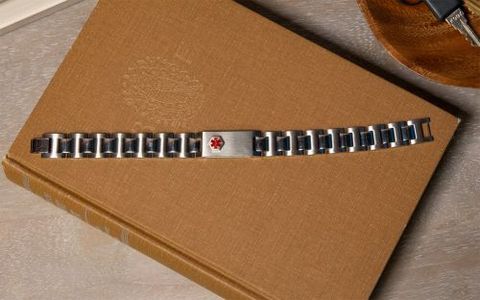The Lynx USB from American Medical ID boasts a traditional style with a stylish metal-link band connected to a flat metal plate. The plate has the universally recognizable symbol for a medical issue, and you can have your essential information engraved on the rest of the plate. However, for a full-profile of your medical treatment requirements, a USB drive is hidden under the plate and swivels out when you twist the medical symbol, making it one of the best medical alert bracelets for a discreet design.
It differs to the best medical alert systems, which are used in the home to help you stay safe if you have an ongoing health condition. The best fall detection sensors can be used inside and outdoors, depending on the model you choose.
The USB drive has almost 7.5GB of storage. This is almost twice as much storage as the Key2Life Sport and Key2Life Paracord. This also explains, to a degree, the $50 price. It's also the only medical ID bracelet I reviewed made entirely of metal, which gives it a more traditional watch-band look.
The downside to the metal-link band is the overall comfort. On my wrist, it was very loose and moves around a lot. It's possible to adjust the fit by removing links, but this requires special tools to punch out pins. The links didn't snag my arm hair as much as silicone bracelets, but it still wasn't comfortable and doesn't come close to the canvas straps. That said, some people prefer loose fits, so this could be ideal if you like the jangly jewelry type fit.
The loose fit was especially noticeable during the exercise test. While the metal doesn't pose the same hygiene risk as canvas bracelets, the looseness of the bracelet was a safety risk. If it catches on a moving object, the metal links aren't going to break, at least not easily as Velcro, and this puts your wrist in danger.
The medical information software installed on the USB drive is frustrating to use, receiving a C- grade for data entry. It uses software called eMedTAG from IdentifyYourself.com. When I launched the software, I had to enter a username and password to enter my data. Since I didn't have either, I clicked on a link to register and it sent me to a URL that doesn't exist. When I clicked on the "Having Trouble?" link, I was also sent to a non-existent URL.
Unable to register, I visited the American Medical ID website, which makes the bracelet, and asked the live chat for help. The response was slow to respond to my query for a proper URL and the response was unhelpful. The support representative told me I'd have to call their support number. When I explained that getting a URL over the phone is silly, that they could just paste it into the chat, I received a rude response. Eventually, I discovered the instructions for registering were included on the USB drive, but this was not made clear anywhere.
Summary
The Lynx USB has some good things going for it. It has almost 7.5 GB of storage, which means you can put a lot of information on it, including non-medical related stuff. But the comfort and adjustability level aren't great unless you prefer loose bracelets and the software is not easy to use.

